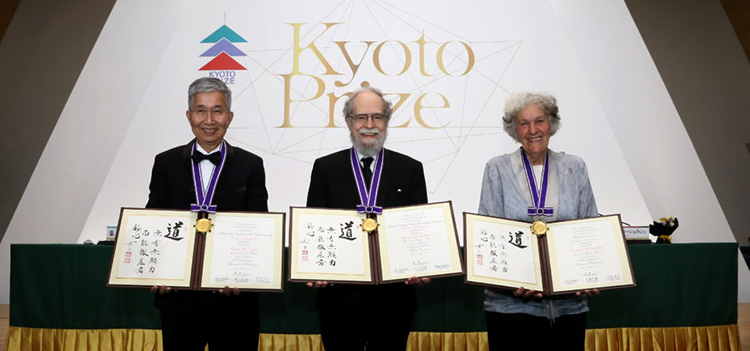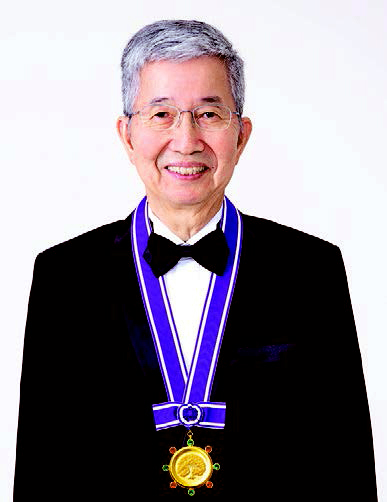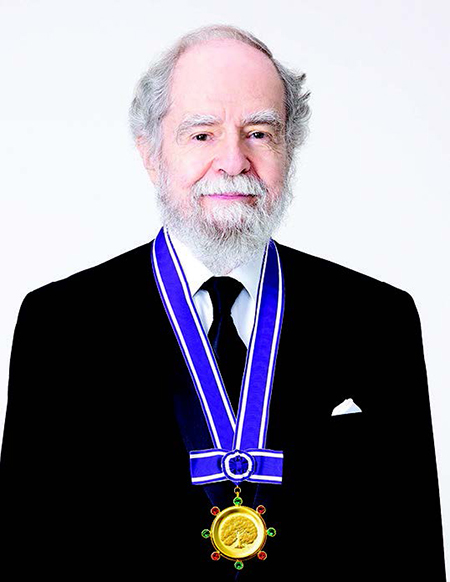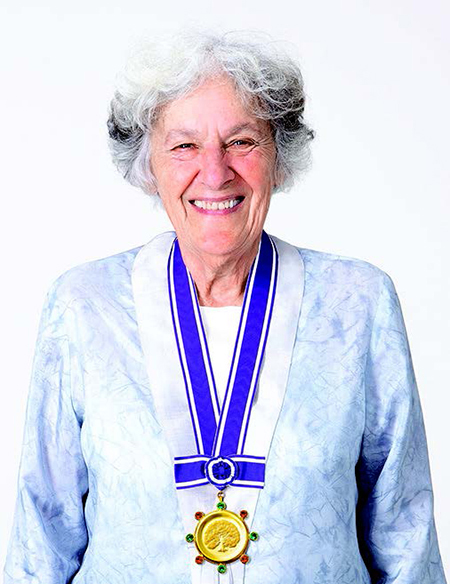By:
- Amanda Rubalcava
Published Date
By:
- Amanda Rubalcava
Share This:

Due to national and international concerns over COVID-19, the Kyoto Prize Symposium 2020 events have been postponed. A new date will be communicated soon. Our sincerest apologies for any inconvenience this might cause.
International Leaders in Technology, Science and Arts to Speak on Campus as Part of Kyoto Symposium
UC San Diego will host international leaders in advanced technology, astrophysical sciences and theatre March 18-19 as part of the annual Kyoto Prize Symposium. The event celebrates the recipients of Japan’s highest private award for global achievement, and will honor current Kyoto Laureates named in 2019: Ching W. Tang, advanced technology; James E. Gunn, basic sciences; and Ariane Mnouchkine, arts and philosophy.
Because Mnouchkine is not able to attend the event, Allan Havis, playwriting faculty member and chair of UC San Diego’s Department of Theatre and Dance, has been selected to lead a discussion March 19 on the performing arts in her absence.
Open to the public, the free talks provide an opportunity for campus community members and San Diego residents to learn about the achievements of the Kyoto Prize Laureates and their impact toward the betterment of mankind.
Awarded by the Inamori Foundation, the Kyoto Prize has been hosted by UC San Diego for 16 years. “As one of the world’s leading scientific research universities that also enjoys esteemed programs in arts, humanities and social science, UC San Diego has much in common with the Inamori Foundation,” said Chancellor Pradeep K. Khosla. “We are both committed to scientific progress, cultural advancement, and human betterment through cross-disciplinary research. We also share the belief that there is no higher calling than to work for the greater good of all humankind.”

Ching W. Tang, Kyoto Prize Laureate in Advanced Technology
Tang is renowned for his pioneering work in developing organic light-emitting diodes (OLEDs) and their widespread application in displays, televisions and lighting. Tang studied light emission processes in electrically driven organic materials and invented a new device structure in which two carefully selected materials were stacked, allowing for high-efficiency light emission at low drive voltages. A chemist and professor at the Hong Kong University of Science and Technology and Professor Emeritus at the University of Rochester, Tang is a member of the National Academy of Engineering and has received a multitude of awards and honors, including: Wolf Prize in Chemistry, IEEE Noble Award for Emerging Technologies and the National Inventors Hall of Fame.

James E. Gunn, Kyoto Prize Laureate in Basic Sciences
Gunn is Emeritus Eugene Higgins Professor of Astrophysical Sciences at Princeton University. He led the pioneering Sloan Digital Sky Survey (SDSS) from its hardware design phase, beginning in 1992. SDSS, which has produced a three-dimensional digital cosmic map encompassing a broad region, is regarded among the most ambitious and influential surveys in the history of astronomy. Gunn played a vital role in the project, including planning, instrument development and data analysis, and contributed to the elucidation of the evolutionary history of the universe. He also published many pioneering astrophysical theories. A key contributor to scientific understanding of the universe, Gunn is a member of the National Academy of Sciences. He has received honors including the Crafoord Prize in Astronomy, the Gruber Prize in Cosmology and the National Medal of Science.

Ariane Mnouchkine, Kyoto Prize Laureate in Arts and Philosophy
Mnouchkine is a founder and director of the Théâtre du Soleil in Paris. Since 1964, she has produced masterpieces with historical and political themes referring to traditional performances of both the East and the West. She started her theater in a transformed factory outside of Paris, where it embodies the ideal of “public theater.” Theatre du Soleil often uses physicality, inspired by Japanese Noh, Kabuki and Bunraku, Indian Kathakali and Western works such as Shakespeare. Mnouchkine has been innovating theatrical expressions through her collaborative creations based on the methodology of her unique theatrical organization, which eschews hierarchical order. She holds honorary doctorates from the University of Oxford and Roma Tre University, and was awarded the Golden Lion for Lifetime Achievement in 2007 by the Venice Biennale.
The three talks that are part of the Kyoto Prize Symposium include:
- Ching W. Tang, Kyoto Prize Laureate in Advanced Technology
Wednesday, March 18 from 1:30 to 3 p.m.
Price Center Ballroom West at UC San Diego - James E. Gunn, Kyoto Prize Laureate in Basic Sciences
Wednesday, March 18 from 3:30 to 5 p.m.
Price Center Ballroom West at UC San Diego - In the absence of Mnouchkine, Allan Havis, playwriting faculty and department chair of UC San Diego’s Department of Theatre and Dance, will lead a discussion on the Laureate’s behalf.
Thursday, March 19 from 3:00 to 4:30 p.m.
School of Global Policy & Strategy (Robinson Auditorium) at UC San Diego
UC San Diego will also showcase two of Mnouchkine’s rarely seen films on Tuesday, March 10 at 7 p.m: "Molière" & "1789" at the Institute of the Americas, Hojel Auditorium. The screenings are free and open to the public.
The trio of talks are keynote events within the three-day Kyoto Prize Symposium celebration hosted jointly by UC San Diego and Point Loma Nazarene University. The Kyoto Prize is an international award created in 1984 by Japan’s non-profit Inamori Foundation to honor those who have contributed significantly to humankind’s scientific, cultural and spiritual development.
Please visit the Kyoto Prize Organization website for more information and to register to attend the lectures and film screening.
Share This:
Stay in the Know
Keep up with all the latest from UC San Diego. Subscribe to the newsletter today.



